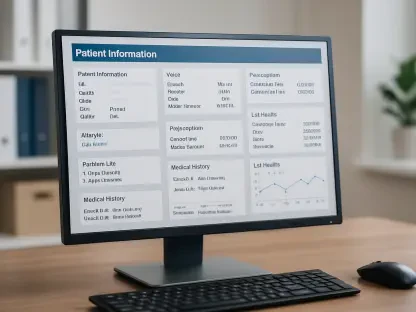In an age where Artificial Intelligence (AI) reshapes various sectors, health data management stands at a crossroads marked by significant promise and potential peril. AI’s integration in healthcare promises to revolutionize medical treatments, diagnostics, and patient care management. However, it simultaneously poses profound challenges concerning the privacy, security, and ethical use of individuals’ health data. As society grapples with these technological transformations, an urgent need arises to examine how AI affects personal autonomy, regulatory frameworks, and the balance between innovation and privacy in health data management. This exploration will navigate through these critical dimensions, revealing the stakes involved in leveraging AI-driven advancements in healthcare.
AI’s Role in Modern Healthcare
Transformative Potential and Technological Advances
AI technologies have ushered in innovative solutions that enhance predictive analytics, patient diagnostics, and personalized treatments. These advancements have the potential to optimize healthcare delivery by analyzing vast datasets at unprecedented speeds, offering new insights into diseases like diabetes, cancer, and neurological disorders. AI algorithms can identify patterns otherwise invisible to human clinicians, enabling early intervention and preventive care strategies. This ability to predict and manage health outcomes more effectively can significantly improve patient experiences and outcomes, revolutionizing traditional healthcare methods.
Furthermore, AI applications extend beyond diagnostics to include the management of electronic health records (EHRs), telemedicine, and patient monitoring through wearable devices. AI-powered EHR systems streamline data entry, automate administrative tasks, and enhance decision-making by providing healthcare professionals with actionable insights. In telemedicine, AI-driven platforms facilitate remote consultations and virtual care, making healthcare accessible to diverse populations regardless of geographical constraints. Wearable devices equipped with AI algorithms continuously monitor physiological parameters and provide valuable data for chronic disease management and wellness tracking. These technologies together illustrate the transformative potential of AI, empowering healthcare providers to deliver high-quality care while optimizing operational efficiency.
Ethical and Privacy Concerns
Despite its benefits, AI’s integration into healthcare raises significant ethical and privacy concerns. The pervasive collection and analysis of health data prompt questions about who controls this information, how it is used, and who stands to benefit. Privacy issues intensify as tech companies leverage AI to gather sensitive health data, often without explicit user consent. This data mining for profit challenges individuals’ autonomy and raises intricate ethical dilemmas related to informed consent, data ownership, and the potential for misuse.
Given the power imbalance between individuals and large corporations, transparency and accountability become paramount in AI-driven health data systems. The risk of data misuse by insurers, employers, or third-party data brokers further complicates the landscape. Data anonymization and de-identification techniques aim to protect privacy, but they are not foolproof against re-identification attacks. These unresolved ethical challenges necessitate robust regulatory frameworks and ethical guidelines to safeguard individuals’ rights and privacy while fostering public trust in AI applications within healthcare.
Navigating Regulatory Landscapes
Current Legal Frameworks and Their Shortcomings
Existing legal frameworks often struggle to keep pace with rapid technological advancements in health data management. Traditional privacy laws and regulations, such as the Health Insurance Portability and Accountability Act (HIPAA), provide essential safeguards but are ill-equipped to address the complexities introduced by AI systems. These laws primarily focus on healthcare providers and fail to account for non-traditional data collectors, such as mobile apps and wearable device manufacturers, that operate outside the scope of conventional healthcare settings.
Moreover, international variations in data protection laws further complicate global data management practices. Initiatives like the General Data Protection Regulation (GDPR) in the European Union offer comprehensive data protection measures, emphasizing user consent and data minimization. However, these regulations may not seamlessly apply to healthcare systems operating in different jurisdictions with their own legal nuances. The fragmented landscape invites calls for a more harmonized approach to health data governance, ensuring consistent standards and practices across borders. Addressing the inadequacies of existing regulations will require collaborative efforts from governments, industry leaders, legal experts, and healthcare professionals to develop forward-looking policies that prioritize patient autonomy and privacy without stifling innovation.
Collaborative Strategies for Improved Regulation
Collaboration and dialogue among stakeholders are crucial for developing effective regulatory strategies that align with the evolving healthcare ecosystem. Policymakers must work closely with technological innovators to anticipate future trends and proactively design adaptive legal frameworks. Encouraging cross-sector partnerships will enhance the understanding of emerging technologies and their potential implications, enabling swift regulatory responses to protect public interest.
Furthermore, engaging patients and advocacy groups in creating policies ensures that regulations address real-world concerns and empower individuals to make informed decisions about their health data. Transparency initiatives, such as clear communication about data collection practices and possible risks, empower consumers and foster trust. Integrating ethical considerations into the design and deployment of AI solutions underscores a commitment to responsible innovation that respects societal values and ethical norms. By fostering a collaborative approach to policy development, societies can navigate the complex intersection of AI, health data, and privacy while safeguarding individuals’ rights and autonomy in the digital age.
The Power Dynamics and Societal Implications
Data Brokers and Industry Practices
The expansion of AI-driven health technologies has given rise to data brokerage, where companies buy and sell personal health information. Data brokers wield substantial influence, linking disparate datasets to create detailed profiles of individuals without their explicit consent or knowledge. These profiles can be used for various purposes, including targeted advertising, insurance underwriting, and employment screening. The lack of transparency in data brokerage practices raises concerns about how these profiles intersect with discriminatory practices and erosion of privacy.
The blurred lines between beneficial data use for healthcare improvements and potential misuse underline an urgent need for ethical guidelines and oversight. While data brokers can potentially facilitate medical research by providing access to large datasets, the absence of robust consent mechanisms raises questions about how such data is gathered and whether individuals can opt out. Addressing the ethical quandaries associated with data brokerage requires a shift towards more transparent practices that empower individuals to have greater control over their data. Strengthening regulatory measures and promoting self-regulation within the industry can contribute to fostering ethical practices while maximizing the benefits of data-driven insights for healthcare advancements.
The Influence of Tech Giants
Tech giants’ growing involvement in health data management introduces social and biopolitical concerns, where their economic power can significantly influence health behaviors and public policy. Companies like Google, Apple, and Amazon have invested heavily in AI-driven healthcare solutions and wearable devices, positioning them as key players in the health sector. This concentration of power raises questions about accountability and the potential impact on healthcare delivery and access.
These companies’ ability to determine how data is collected, analyzed, and utilized gives them unprecedented insights into individual and societal health trends, positioning them as de facto health authorities. This influence, however, must be scrutinized in light of ethical considerations and societal implications. Policymakers, healthcare providers, and the public must engage in discussions about the appropriate roles of these companies and establish checks and balances to ensure that their involvement serves the greater good. Empowering individuals to make informed choices about the technologies they use, and advocating for open standards and interoperability between systems, can help prevent monopolistic practices and foster a diverse and equitable healthcare ecosystem where innovation serves societal interest.
Personal Autonomy and Future Directions
Empowering Individuals and Enhancing Control
Ensuring personal autonomy in the age of AI-driven health data management demands that individuals take active roles in their digital agency. People need to be informed about the technologies they engage with, understanding data collection practices, consent mechanisms, and potential implications for their privacy and personal information. Increased awareness empowers individuals to make informed choices and demand transparency and accountability from data handlers, reinforcing their control over personal health data.
Promoting digital literacy and aligning consumer education with technological advancements can help bridge knowledge gaps and foster greater public engagement with these issues. Public awareness campaigns, workshops, and digital literacy programs equip individuals with the skills to evaluate privacy risks and navigate complex consent processes effectively. Engaging healthcare professionals in these educational efforts ensures that patients receive clear communication and guidance on navigating digital health solutions responsibly. As individuals become more proactive in asserting their digital rights, they contribute not only to safeguarding their autonomy but also to shaping a more ethical and accountable future for AI-driven health data management.
Recommendations for a More Transparent Future
Building a transparent and accountable future for AI-driven health data management involves a multifaceted approach that combines legal reforms, technological innovation, and public engagement. Legal frameworks must prioritize patient autonomy and address ethical challenges associated with AI applications in healthcare, emphasizing user-centric design and privacy-by-design principles. Strengthening penalties for privacy breaches and establishing enforcement mechanisms ensure adherence to privacy standards.
Technological innovation should explore privacy-enhancing technologies, such as differential privacy and federated learning, which allow for data analysis without compromising individuals’ identities. Collaborations between tech companies, healthcare providers, and academic researchers can drive the development of secure and ethical data sharing models that balance privacy concerns with the advancement of medical research.
Public engagement remains central to fostering an informed and empowered society that participates actively in shaping the digital health landscape. Encouraging public discourse, soliciting feedback, and facilitating collaborative dialogues between stakeholders ensures that policies align with societal values and expectations. By prioritizing transparency, accountability, and ethics in AI-driven health data systems, society can harness the transformative power of technology while respecting individual rights and autonomy, charting a path towards a more equitable and sustainable healthcare future.
Concluding Insights
In today’s world, Artificial Intelligence (AI) is making waves across various industries, and one area seeing tremendous transformation is health data management. AI has the potential to bring about a significant shift in how medical treatments, diagnostics, and patient care are managed, offering promises of enhanced efficiency and better outcomes. However, with these advancements come serious concerns. The integration of AI into healthcare presents pressing challenges related to the privacy, security, and ethical use of personal health data.
As we embrace these technological advancements, it’s crucial to consider how AI impacts personal freedom, existing regulations, and the delicate balance between fostering innovation and protecting privacy. Questions about who owns health data, how it’s used, and who it benefits are central to this discussion. Furthermore, there is an ongoing debate about creating transparent, accountable systems that stakeholders can trust.
This exploration dives into these critical concerns, highlighting the importance of carefully navigating the integration of AI-driven technologies in healthcare. It’s about ensuring that the tremendous benefits AI offers do not overshadow the need for ethical considerations and regulatory oversight. This balance between opportunity and caution is essential to leveraging AI’s potential while safeguarding individuals’ rights and privacy in the realm of health data management.









